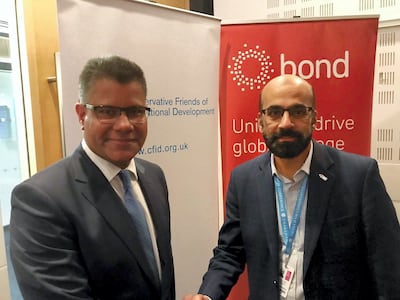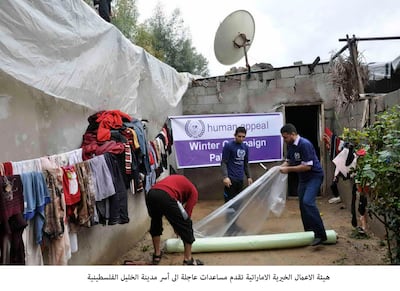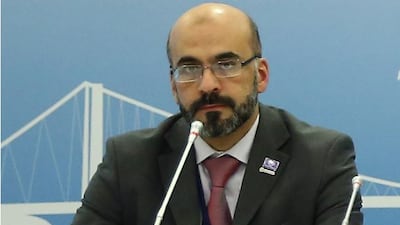One of Britain’s largest Muslim charities was found to be culpable of misconduct after it failed to report for months that extremists in Syria had seized its aid lorries and a warehouse, the UK's charity regulator said.
A report by the Charity Commission criticised the former leadership of Human Appeal over a series of financial and management problems that led to the removal in 2018 of three senior executives, including chief executive Othman Moqbel.
Mr Moqbel now heads the UK’s largest Syria aid group, Syria Relief, and has attended several high-level meetings since his dismissal with prominent politicians, including Cop26 President Alok Sharma.

The investigation by the Charity Commission revealed that a warehouse operated by Human Appeal was seized by a group affiliated with Al Qaeda in October 2017, but the charity failed to raise the alarm for nearly two months.
Human Appeal also failed to tell regulators for eight months that three of its lorries carrying flour were seized by an armed group in Syria.
The revelations prompted the UK regulator to launch an inquiry into the charity which uncovered further examples of mismanagement.
The commission found that it had broken tax laws in Turkey and Greece, which cost the charity tens of thousands of pounds.
It also discovered that Human Appeal had failed to carry out due diligence on a donor who gave $1.95m to the charity’s Syria Flour Programme.
The commission’s report also found evidence of misconduct and mismanagement in the administration of the charity, with trustees’ failing to monitor their executives and being “too trusting” of them.
“Good governance is not a bureaucratic detail — it underpins the delivery of a charity’s purposes to the high standards expected by the public,” said Steve Roake, head of compliance visits and inspections at the Charity Commission.
“Our inquiry found that the then trustees of Human Appeal did not have the oversight needed regarding the activities of their charity.
“While trustees of larger charities will delegate certain tasks to staff members, we and the law are clear that trustees retain ultimate responsibility for running their charity, and our guidance is clear that trustees must ensure that robust reporting procedures are in place.
“Responsibility for ensuring they have sufficient information and are adequately informed to make decisions rests with the charity trustees.”
The charity suspended Mr Moqbel after eight years as its chief executive in late 2017 following the seizure of its aid warehouse by extremists. He was dismissed a few months later.
Al Qaeda-linked Hay’at Tahrir Al Sham seized the charity's warehouse in Syria on October 8, 2017, but the trustee board, apart from the chairman at the time, were only made aware at a trustee meeting on November 23, 2017.
In December 2017, Human Appeal referred itself to the commission, which then launched a statutory inquiry.
“In this case, the inquiry found that the executive staff’s failure to follow the charity’s policy and report the events described was mismanagement by the executive,” the report concluded.
“The failure to report the incidents in a timely manner to the police and commission was misconduct by the then trustees and was fundamentally caused by the then trustees’ failure to maintain sufficient operational awareness of the charity’s activities.
“The inquiry concluded that there had been misconduct and mismanagement in the administration of the charity by its then trustees and identified that a significant factor in the misconduct was insufficient oversight of the charity’s executive by the then trustees.

“While systems and processes did exist to ensure the then trustees were kept up to date with matters at the charity, the then trustees were too trusting of the executive and were not robust in their questioning of them.
“The inquiry found that some important information, which should have been the subject of prompt action by the then trustees and executive, was withheld from the then trustees and that this prevented the then trustees making informed decisions.”
Greater Manchester Police previously told The National that it had closed a criminal inquiry into activities at the charity but following the outcome of the commission's report, action could still be taken.
Mr Roake said the charity has made improvements since it launched its inquiry.
“The report acknowledges that during the inquiry, the current trustees have made significant improvements to the governance of the charity,” Mr Roake said.
“This includes changes in key personnel in both the trustee board and the executive, and other improvements in governance.”
Human Appeal's new chief executive, Dr Mohamed Ashmawey, said the charity has addressed issues raised in the inquiry and operates a zero tolerance for policy breaches.
“Human Appeal has been transformed by the fundamental changes that we have implemented over the last three years, with the full support of the current chair who commissioned the original independent inquiry and proactively alerted the Charity Commission in the weeks after his appointment in 2017,” he said.
“Several issues raised in the commission’s report were already being addressed when the inquiry launched. We have subsequently addressed other issues and ensured continued attention for issues which demand an ongoing focus. Beyond this, we have fostered a culture of zero tolerance for breaches of our policies and strive for continuous improvement in all we do.
“As we move on, we will continue to put transparency and accountability at the heart of what we do and now focus all our efforts on saving lives and supporting vulnerable communities in complex and challenging environments around the world.”


